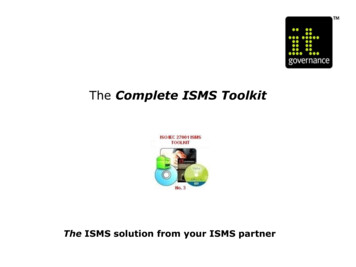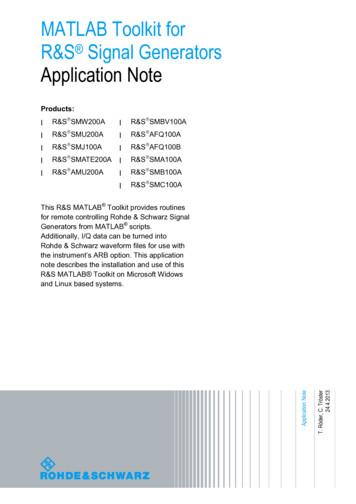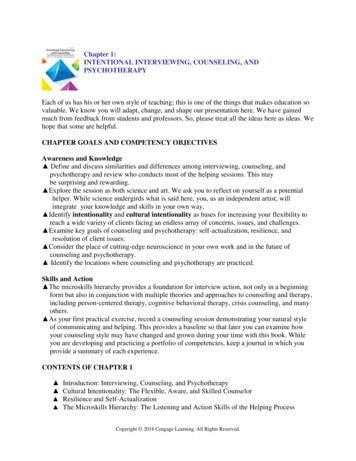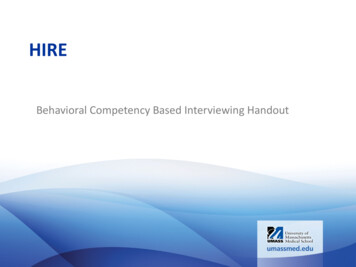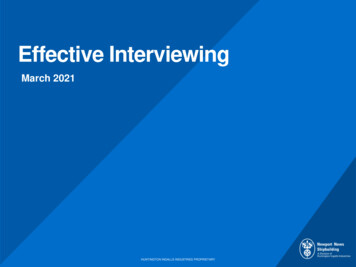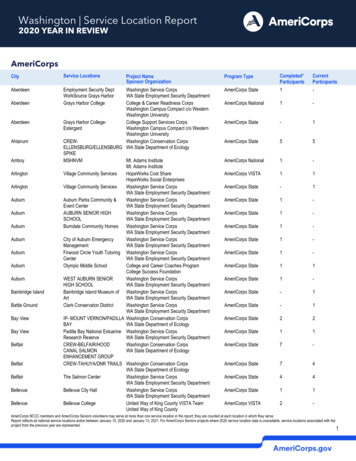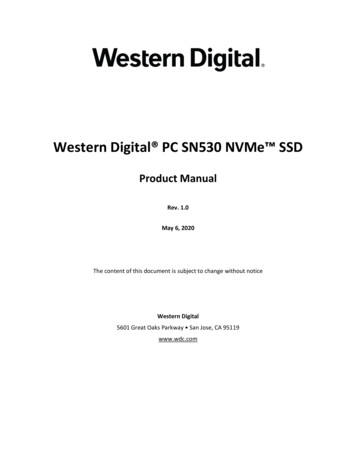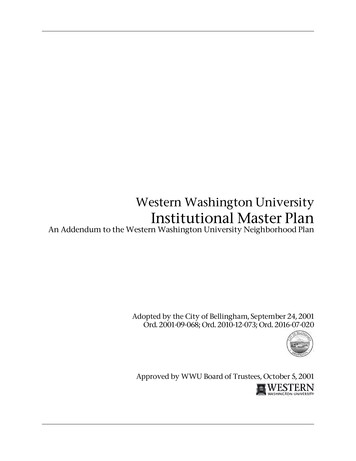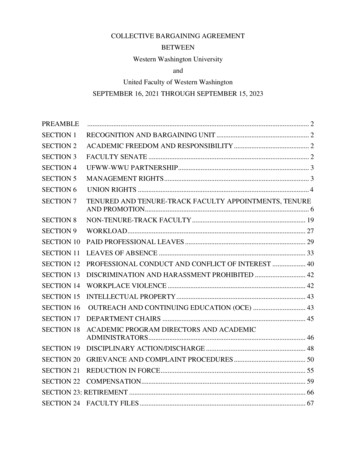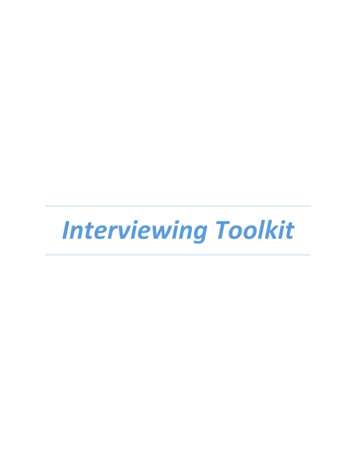
Transcription
Interviewing Toolkit
Table of ContentsPhone Interviews/Phone Screens . 3Face-to-Face Interviews . 4Interview Question - Styles . 5Interview Questions . 6Reference Checking . 82 Page
Phone Interviews/Phone ScreensWell done! You have successfully screened your application pool to a point where you are ready for phoneinterviews/ screens.Phone interviews/ screens are not a requirement of the interview process, but can be very helpful if you have alarge group of candidates that you want to narrow down for face-to-face campus interviews.Phone interviews/screens do not require approval.Tips: Be as prepared and enthusiastic over the phone as you would be for a face-to-face interviewPrepare questions that will help you effectively screen your candidatesFind a quiet room where there will not be extra noise so your candidate can truly hear and understandyour questions – limit the number of search committee members at the phone screen as it can getconfusing if there are several people asking questions/respondingA phone interview should be no more than ½ hourHow to Successfully Conduct a Phone InterviewMake an Appointment. Schedule a time with your candidate so they can prepare and ensure they are in a spacewhere they are able to converse freely. Be considerate of their time – many candidates are currently employedand going over appointment time could be putting them in a bind.Prepare. Have the candidates resume/cover letter or other requested documentation, list of questions, water,and the job announcement in front of you when phone interviewing/screening.Introduce Yourself. Let your candidate know who you are and your relation to the position. Introduce anyother members of your search committee that may be involved in your phone screen and their relation to theposition. Thank the candidate for setting time to meet with you.Discuss Your Position. Read a summary of your open position. Think of things about the position that you wantto let the candidate know, so that if they are not interested in that type of position, they will bow out during thephone interview/screen stage.Take Good Notes. These are the notes you will refer to when going back to discuss the phone interview/screenwith your search committee. These notes should only include information you received from the phoneinterview – how questions were answered, etc.Next Steps. Let the candidate know what the next steps and when they should be hearing back about theposition.3 Page
Face-To-Face InterviewsHow to Successfully Conduct a Face-to-Face InterviewKnow What You’re Looking For. Reiterate to your search committee (if you are utilizing one) the needs of thedepartment and the position. It is human nature to gravitate toward people who are most like you – whichmight not be the right type of person for the position.Make an Appointment. Schedule a time with your candidate so they have time to effectively prepare. Let yourcandidate know what they can expect at your interview – Length of interview? Group/team interview? Meetwith the Director/VP? Schedule enough time to ensure you can effectively get your questions, as well as anythey may have, answered. You do not want your candidate to feel rushed through the process, you will alsowant to make sure you get enough time to fully determine if this is the candidate you will want to hire.Provide a Welcoming Environment. You will want to conduct your interview in a room that is reasonably privateand comfortable. While this may not be the same type of setting as the actual position, it helps to relax yourcandidate by having a calm environment. You can bring your candidate to the workstation/department to showthem where they would be sitting/working.Review your Candidates Materials. Reread your candidate’s cover letter and resume.Have a Schedule. Set up a general structure for the interview. This way you can ensure you have enough timeto hit all of the key areas you want addressed. Having a schedule will also help you begin and end on time.Remember, most candidates will have another job/obligations, so going over time may put them in a bind.Prepare Questions. There is a sample set of interview questions at the end of this toolkit. You will want todevelop questions based off your position and its needs. You will need the set of questions to be the same forall candidates who are interviewing for your position. If your candidate answers a question that requires followup or additional questioning, you can utilize different follow-up questions.Be Prepared. Be prepared for questions that your candidate may ask – benefits? Pay? Schedule? OfficeEnvironment?Take Notes. These are the notes you will be using to help determine where your candidates rank. You will notneed to write down everything, but note highlights and things you want to follow up on. Notes should onlyinclude information received during the interview. How effective they answered questions, communicationskills, etc. for example.Next Steps. Let the candidate know about the next steps and when they should expect to hear back from youregarding the position.Communication. Call your interviewed candidates as soon as possible if you are not moving forward with themfor hire. You can wait for this step until after your candidate has accepted the position. You will also want tosend out email communications to any candidate who applied for your search that didn’t make it tointerview/hire to let them know that the position has been filled.4 Page
Interview Questions - StylesThere are several different styles of interview questions.Technical. These types of questions help to evaluate a candidate’s technical ability to do the job. Are therespecific technical aspects to your position? Craft the questions to sense your candidate’s depth of technicalexpertise. Describe how you complete a business process analysis (bpa).What size wire would be needed to complete the circuit? (shown a diagram)What is the most sophisticated way you have used Excel? What formulas have you utilized?Behavioral. These questions are based around “tell me about a time when ” These questions can help reveal acandidate’s strengths and weaknesses because they show how your candidate acted/responded in a real lifesituation. It can be a predictor of how they will handle future situations. Determine the types of situations thatoccur in your office and use those scenarios to craft behavioral questions. Tell me about a time when you had to have a difficult conversation with a co-worker/employee.Give me an example of a time when you lead through change.During your busy times, how did you handle your workload to get it all completed?When you disagree with a co-worker/supervisor, what did you do?Describe the most difficult project/presentation/report you had to complete.Informational. These are questions asked specifically to find out a specific answer. Sometimes these can beclosed-ended questions. Are you still working at XYZ Company?Have you reviewed our website and job announcement fully?Tell me about yourself.Why do you feel you are the best candidate for this position?Testing/Real World Scenarios. You would use these types of questions when having a candidate perform anactual task of the position. For example, an Excel test, typing test, tool use, etc. If you are going to conduct a“real world” test, please contact Human Resources so we can help you put together the most effective andimpartial test/scenario.5 Page
Interview QuestionsYou should craft your interview questions for your specific position and departmental needs. Here are somesuggested interview questions that you can update with your specific departmental situations. The goal is toalways ask questions that will not result in a canned response. With the internet, it is easy to look up typicalinterview questions and find appropriate answers. Please update these questions with your language/verbiageto get the answers you need to find your next best-in-class hire. Why should we hire you? OR Why do you want this position?What part of this job would be the most challenging?What are your greatest strengths? Weaknesses in regards to the skills necessary for the position?What do you find are the most difficult decisions to make?How would your references describe you?Describe the responsibilities and duties of your current position.What was the biggest challenge of your present job?What was it about your last or previous job that interests you?What is it about this position that interests you?What type of environment do you work best in?What immediate contributions can you make to this position?What kind of supervisor gets you to put forth your best performance?What kind of feedback works best for you and why?What are some things you wish to avoid in your next job?What would you expect to get out of this job?Why do you want to work for the university?What do you consider to be your major accomplishments in your current (or previous) position?What is your concept of an ideal work environment?What inspires or motivates you to do your best?What are your long-range/short-range goals?What experience do you have working (or supervising) people of diverse backgrounds?Questions for Supervisory/Management Positions How would you describe your management style?How many people did/do you supervisor in your present/previous position?How do you think your subordinates perceive(d) you?What would you look for when hiring people?What experiences have you had in leadership positions?What is your management philosophy?How do you motivate staff?6 Page
Interview Questions - ContinuedBehavioral Based Questions Describe a high-pressure situation you had to handle at work. Tell me what happened, who wasinvolved, and what you did in terms of problem solving.People differ in their preference for jobs that have well laid out tasks and responsibilities or ones inwhich work changes frequently. Tell me about a time when you were successful in dealing with anunstructured work environment.Many situations at work require fast thinking and speed in making decisions. Give me an example of asituation in which you were especially skillful in making a decision quickly.What types of experiences have you had in talking with customers or clients? Specifically, tell me abouta time when you had to communicate under difficult circumstances.Some situations require us to express ideas/opinions in a very tactful and careful way. Tell me about atime when you were successful with this particular skill.The word “communication” means different things to different persons at different times. Tell me whatthis word means to you by giving me an example of a time when you were able to be warm and amiableas a communicator.At times, we are all required to deal with difficult people. An even more demanding factor is to be ofservice to a difficult person. When have you been successful with this type of situation at work?Having a good solution for a problem often entails more than just being intelligent. Often, exercise ofgood judgment is needed to complement logic in choosing a practical solution. Describe when you usedgood judgment in solving a problem.Tell me about a time when you showed high enthusiasm and energy in order to create positivemotivation in others. Give me a specific example.Getting the job done may necessitate unusual persistence or dedication to results especially when facedwith obstacles or distractions. Tell me about a time in which you were able to be very persistent inorder to reach goals. Be specific.7 Page
Reference CheckingOnce you have completed your interviews and you are ready to make a decision, you are required to conductreference checks. You will need to do your due diligence in contacting all 3 references for your finalist. Areference check is a time when you can confirm the information your candidate listed on their resume/coverletter. You will also be able to gain a clearer picture of their skills and abilities by getting the information fromsomeone who has seen your candidate perform.Some candidates will ask you not to contact a reference while going through the recruitment/hiring process. Aspart of your hiring process, you will need to do your best in hiring the best-of-class, which will involvecontacting previous supervisors/current supervisors. You can concede to not contacting the references whilethe search is in progress, but if your candidate is the finalist of choice, you will need to be able to contact thecurrent supervisor.Calling references is the recommended method. Letters of recommendation are used to supplement thereference process and should not take the place of reference checking.Take Detailed Notes. With as many references you are going to call you will want to make sure you havedetailed notes to return to when making decisions on your next best-in-class hire.Be Careful Not To Already Have Your Mind Made Up. If you just interviewed someone who was an amazingcandidate, you may already have your mind made up that this is the candidate for you and your department.This can sway how you ask questions or what you are willing to hear in a reference check. Sometimes this canlead to driving your conversation in your favor instead of hearing what the referee may be saying – or NOTsaying.Ask for More References if Necessary. If you are conducting a reference check and the only information theywill give is hire dates and titles – ask your candidate for an additional reference name. This is one of the mostimportant pieces of your recruitment, and you need to get the information to make the best choice. If you havecontacted one of your candidate’s references, and they refer you to another person – let the candidate knowthat you will be contacting additional references.How to Conduct a Reference CheckIntroduce Yourself. Let the reference know who you are and that you are calling to inquire about a candidateyou are considering for hire. Ask if it is a good time for the discussion, or if they would rather set up a time totalk.Consent. Let the referee know that they have been listed as a reference for your candidate and that you havebeen given approval to contact them for information.Explain the Position. Give a brief description of the position in which the candidate is being considered. Thisway your referee can give answers in context to the position they will be performing.8 Page
Interview Questions You should craft your interview questions for your specific position and departmental needs. Here are some suggested interview questions that you can update with your specific departmental situations. The goal is to always ask questions that will not result in a canned response. With the internet, it is easy to look up typical
